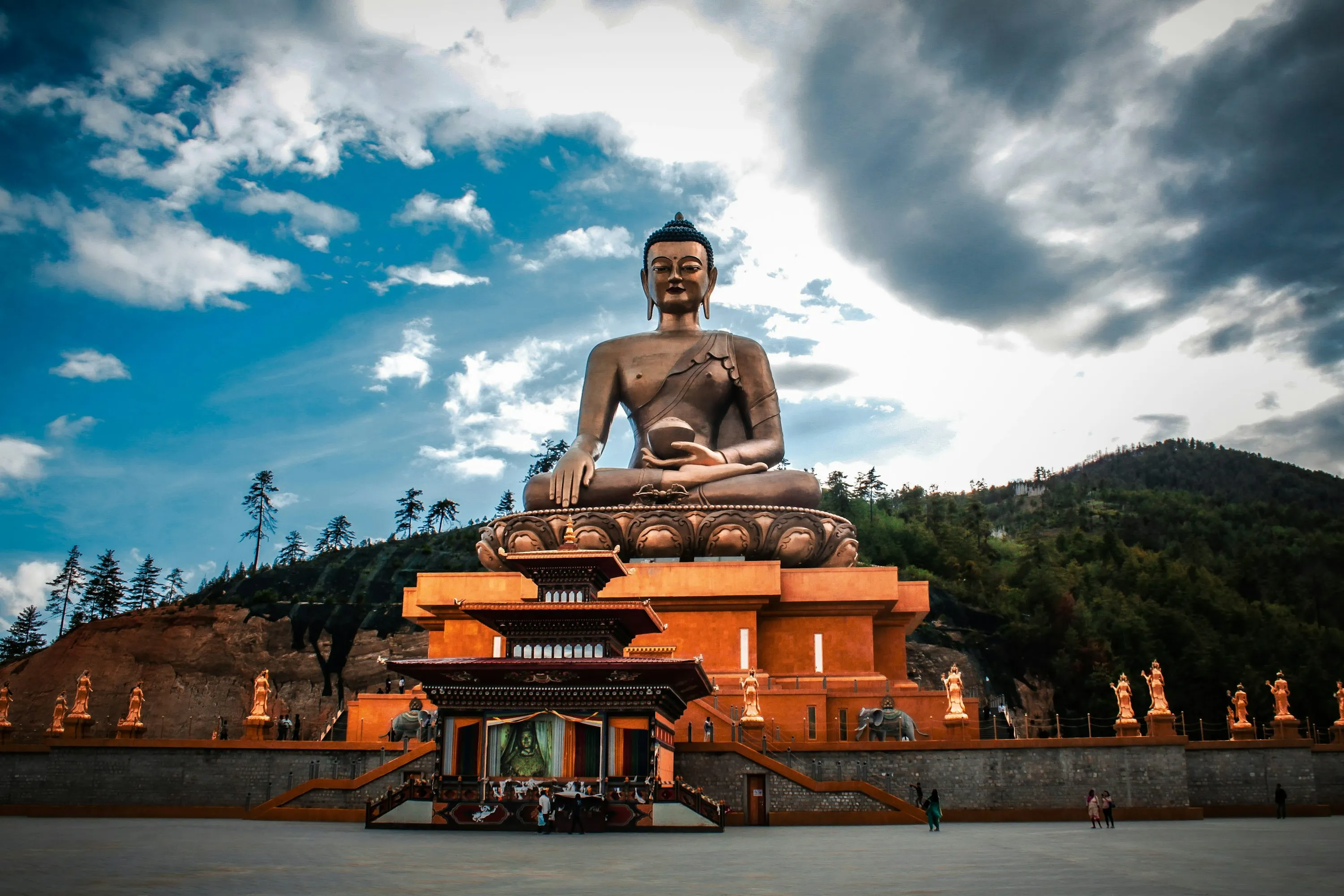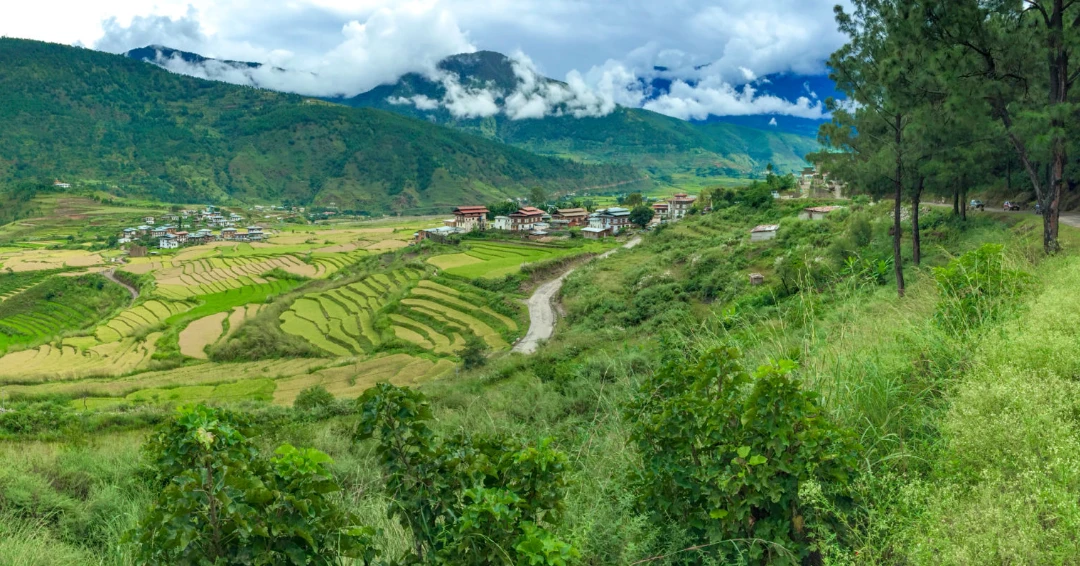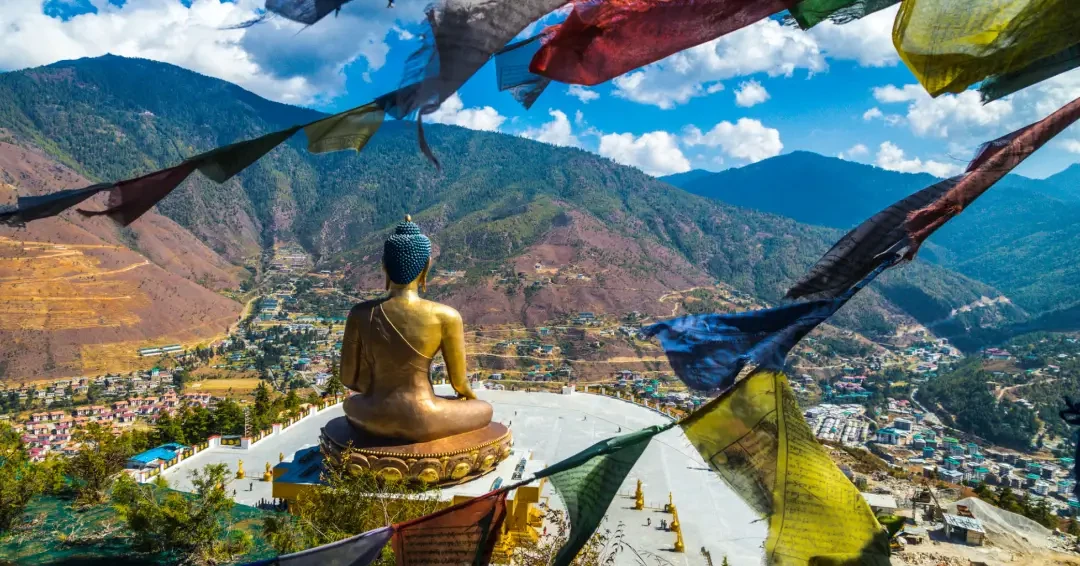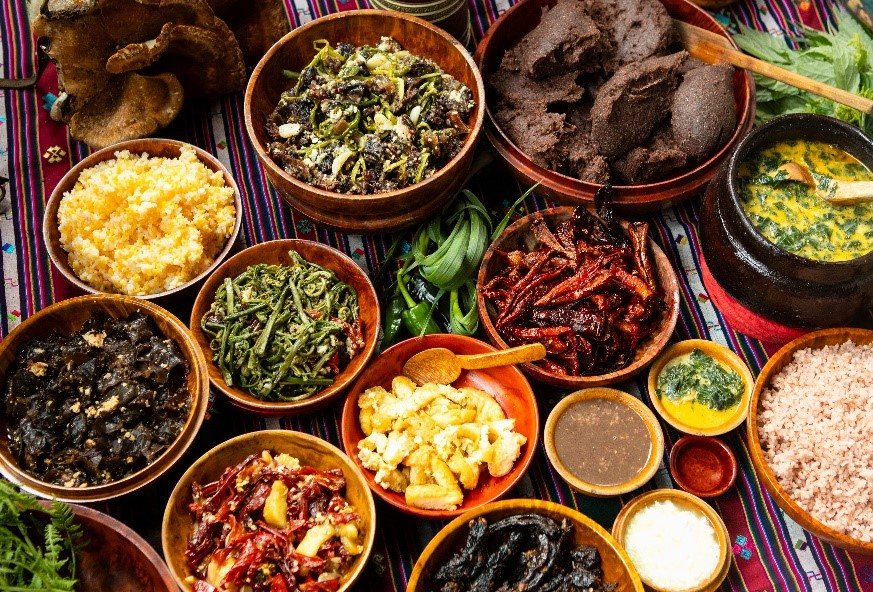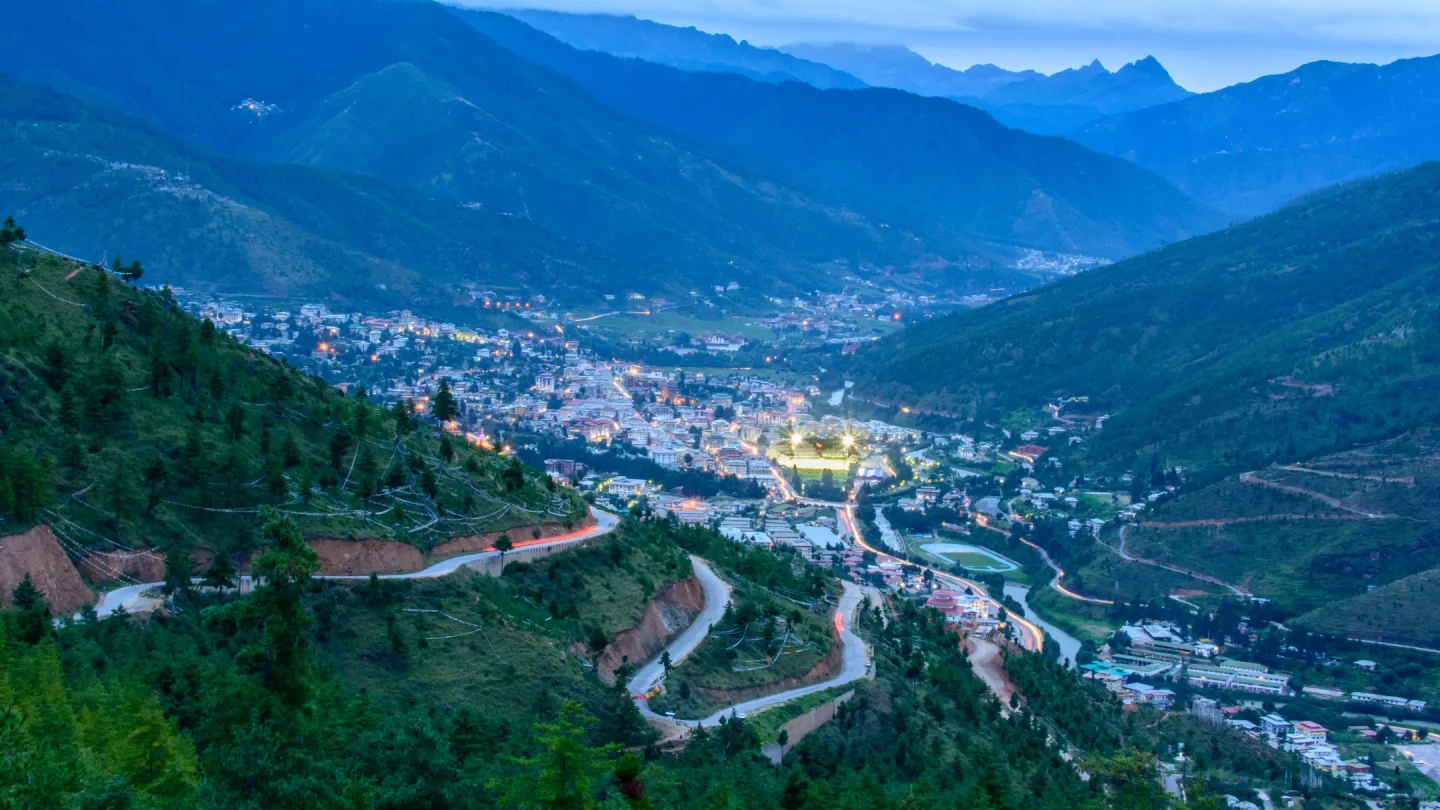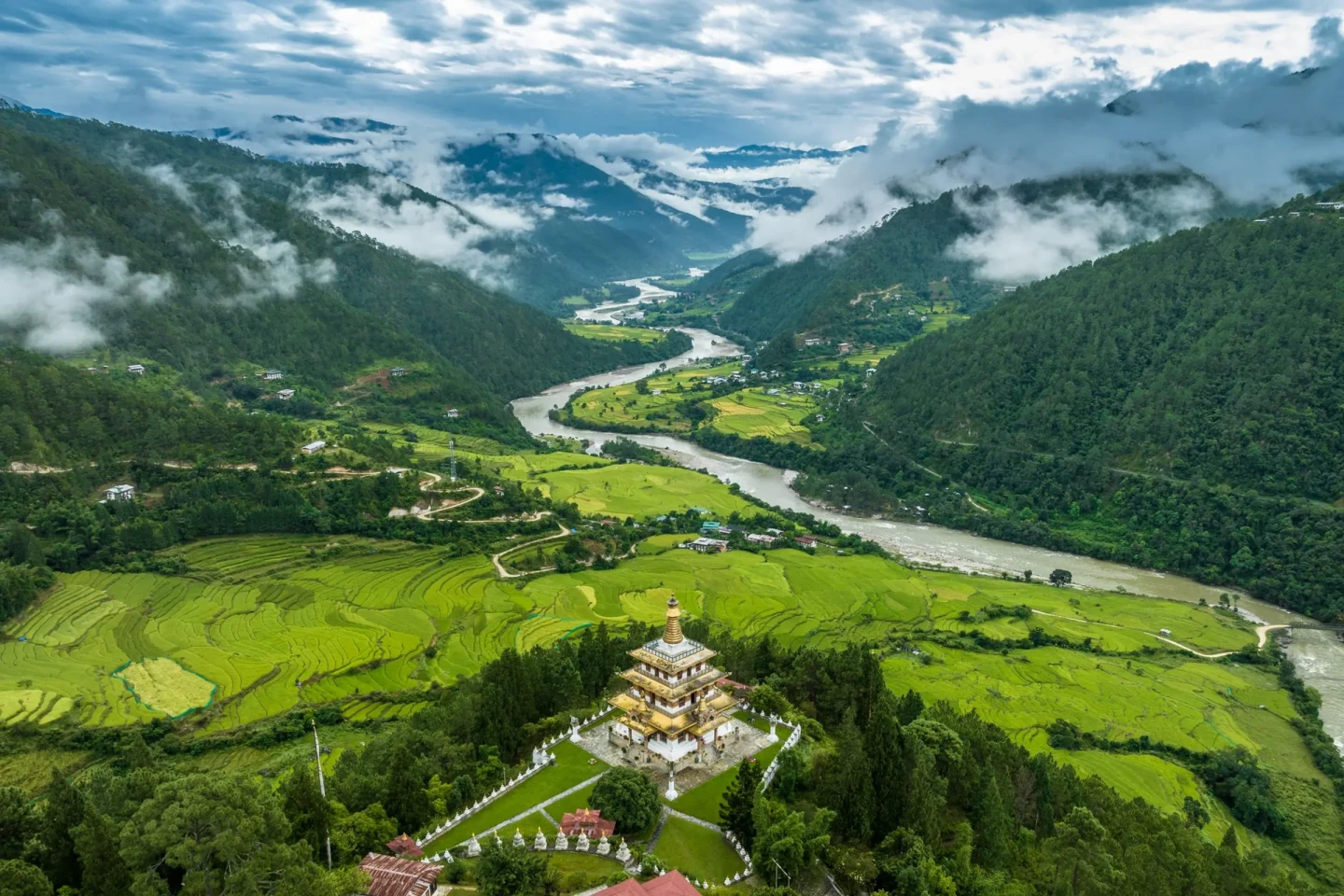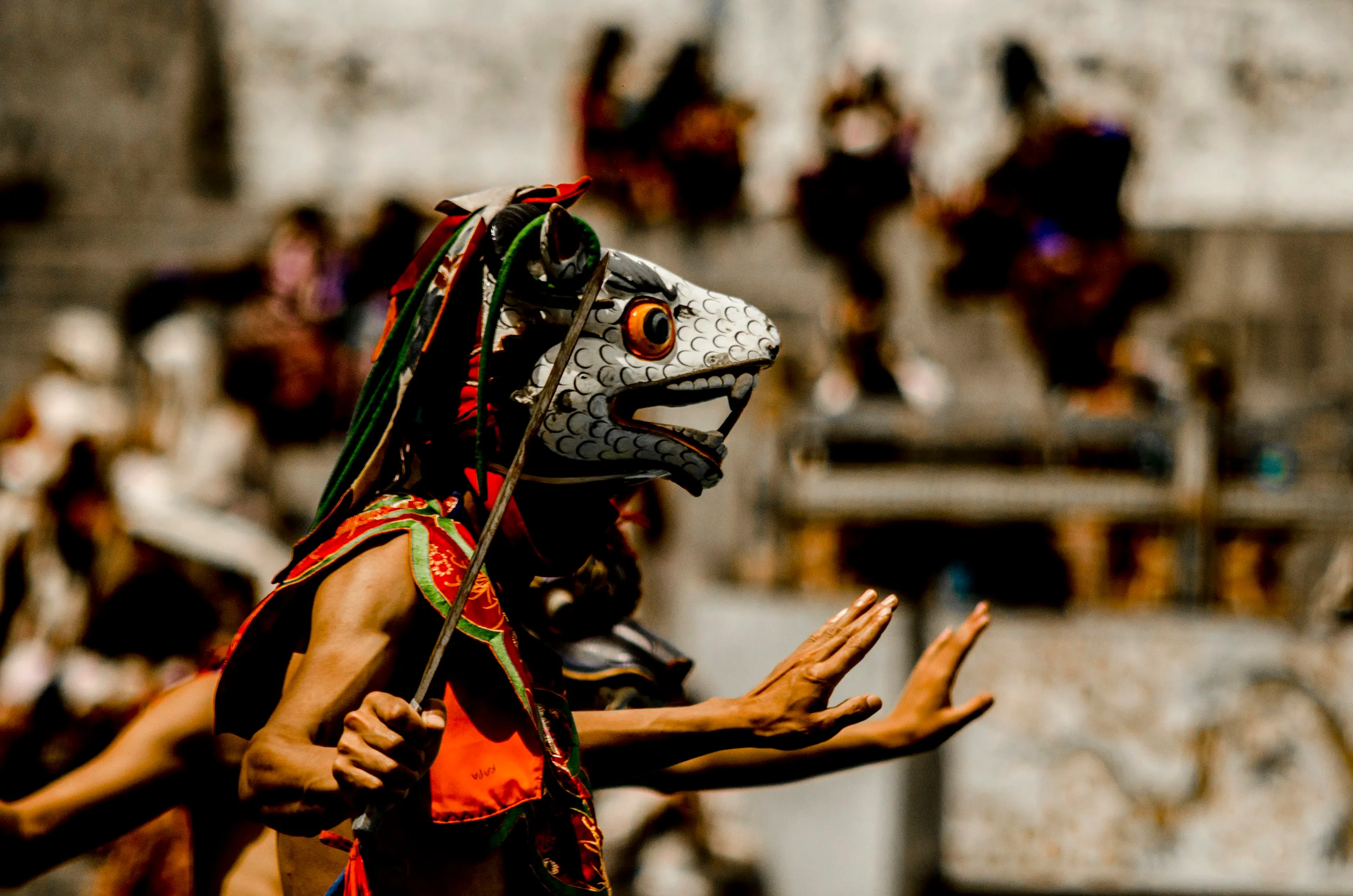Nestled in the eastern Himalayas, Bhutan emerges as a captivating destination that blends pristine natural beauty with profound cultural heritage, offering Gabonese travelers an opportunity to escape the tropical landscapes of Central Africa for the majestic mountains and serene valleys of South Asia. As a landlocked kingdom prioritizing happiness over material wealth, Bhutan invites visitors to immerse themselves in its philosophy of Gross National Happiness, where spiritual fulfillment and environmental preservation take precedence. For Gabonese citizens, accustomed to the lush rainforests, coastal beaches, and oil-driven economy of their homeland, Bhutan presents a stark yet enchanting contrast: instead of equatorial heat and humidity, one encounters crisp mountain air and snow-capped peaks; rather than urban bustle in Libreville, there's the tranquil pace of Thimphu, Bhutan's capital without traffic lights. Diplomatic relations between Gabon and Bhutan, while not extensively developed, are characterized by mutual respect within the framework of international organizations like the United Nations, where both nations advocate for sustainable development and climate action—Gabon with its vast forest conservation efforts and Bhutan with its carbon-negative status. Though direct bilateral ties are limited, with no embassies exchanged, this shared commitment to environmental stewardship fosters a subtle kinship, making Bhutan an ideal spot for Gabonese seekers of authentic, low-impact adventures. Imagine trading Gabon's vibrant Fang oral traditions and French-influenced cuisine for Bhutan's Dzongkha chants and spicy Himalayan fare; the journey promises not just sightseeing but a transformative experience that bridges Africa's equatorial vitality with Asia's spiritual serenity, all while maintaining realistic expectations of a destination that values quality over quantity in tourism.
Visa and Entry Requirements
Bhutan's tourism policy is uniquely controlled to preserve its cultural integrity and environment, mandating that all foreign visitors, including those from Gabon, must book their trips through licensed Bhutanese tour operators rather than traveling independently. This approach ensures guided experiences that align with the kingdom's values, and it directly ties into the visa process. For Gabonese tourists, obtaining a Bhutanese visa begins with selecting a reputable tour operator who handles the application on your behalf; you provide essential documents such as a valid passport (with at least six months' validity from the date of arrival), a recent passport-sized photo, and proof of your tour booking, including itinerary details. The operator submits these to the Tourism Council of Bhutan, which processes the visa approval letter, typically within 72 hours once payment is confirmed. Payment is crucial here, as the visa is only issued after the full tour cost, including the Sustainable Development Fee (SDF), is wired to the council's account—visas are not granted without this financial commitment, emphasizing Bhutan's "high-value, low-volume" tourism model. As of 2025, the SDF stands at USD 100 per person per night for adults (reduced from previous rates to encourage post-pandemic recovery), with children aged 6-12 paying USD 50 and those under 6 exempt; this fee funds education, healthcare, and environmental initiatives, directly impacting the overall pricing of your trip, which might range from USD 250-300 per day inclusive of accommodations, meals, and transport. Upon approval, the visa letter is emailed to you, and the actual visa is stamped on arrival at Paro International Airport or land borders, valid for the duration of your booked tour. Gabonese travelers should note that while eVisas are mentioned in some sources, Bhutan's system remains operator-dependent, so early planning—ideally 30-60 days in advance—is essential to avoid delays, ensuring a smooth entry into this Himalayan sanctuary.
Travel Routes from Gabon to Bhutan
Traveling from Gabon to Bhutan involves multiple legs due to the geographical distance and Bhutan's limited international connectivity, but with careful planning, the journey can be an exciting prelude to your adventure. Starting from Libreville, Gabon's capital and main international hub, there are no direct flights to Paro, Bhutan's sole international airport; instead, routes typically transit through major Asian hubs like Delhi, Bangkok, or Kathmandu. For instance, you might fly Turkish Airlines from Libreville to Istanbul, then connect to Delhi, and finally board Druk Air or Bhutan Airlines—the only two carriers serving Paro—for the short hop into Bhutan, totaling around 20-25 hours with layovers. Alternative paths include Ethiopian Airlines via Addis Ababa to Bangkok, followed by a Druk Air flight, or Air France through Paris to Delhi; expect to pay USD 1,500-2,500 round-trip depending on the season and booking window. Paro International Airport is renowned for its challenging approach amid Himalayan peaks, with flights operating only during daylight and clear weather, leading to potential delays or cancellations—realistic expectations are key, as monsoon rains or fog can disrupt schedules, particularly from June to August. Booking flights should be coordinated with your tour operator, who often handles internal arrangements, and it's advisable to secure tickets 3-6 months ahead for peak seasons. Upon arrival, the thrill of descending into Paro's valley compensates for any transit fatigue, marking the start of your Bhutanese odyssey from Gabon's Atlantic shores to Asia's rooftop.
Best Time to Visit and Seasonality
Bhutan's climate varies dramatically across its seasons, influenced by its Himalayan topography, making trip planning a balance of weather, activities, and cultural events that Gabonese travelers, used to consistent tropical warmth, should carefully consider. Spring (March to May) brings mild temperatures of 10-20°C in valleys, blooming rhododendrons, and clear skies ideal for trekking and sightseeing, though occasional showers might occur; this period aligns with festivals like Paro Tshechu in April, featuring masked dances and spiritual rituals that offer deep cultural immersion. Summer (June to August) introduces the monsoon, with heavy rains up to 500mm monthly, leading to lush greenery but slippery roads, flight delays, and leech-infested trails—less ideal for most, yet perfect for birdwatching or quieter visits to eastern Bhutan. Autumn (September to November) stands out as the prime season, with crisp 5-15°C weather, golden rice fields, and festivals such as Thimphu Tshechu in October, drawing moderate crowds for vibrant celebrations honoring Guru Rinpoche. Winter (December to February) offers cold snaps down to -5°C at higher altitudes, but sunny days and fewer tourists make it suitable for cultural tours in western valleys, with events like Punakha Drubchen in February showcasing monastic traditions. For Gabonese visitors seeking respite from humidity, autumn or spring are recommended, avoiding peak crowds in October while enjoying stable weather for hikes like Tiger's Nest; however, always pack layers, as elevations from 200m to over 4,000m create microclimates that demand flexibility in your itinerary.
Money, Costs, and Payment Methods
Navigating finances in Bhutan requires understanding its currency and payment ecosystem, which blends tradition with emerging modernity, a shift from Gabon's CFA franc-based economy. The Bhutanese Ngultrum (BTN) is pegged to the Indian Rupee at par, and while USD is widely accepted for larger transactions, carrying a mix of USD cash and Ngultrum is prudent for smaller expenses. Exchange facilities are available at Paro Airport, major banks like Bhutan National Bank, and hotels, but rates favor airports or authorized money changers; ATMs are prevalent in towns like Thimphu and Paro, accepting Visa and Mastercard with withdrawal limits around BTN 20,000 (about USD 240) per transaction, though rural areas lack them, so plan accordingly. Credit cards are increasingly accepted at upscale hotels, handicraft shops, and tour payments, often with a 3-5% surcharge, but cash reigns supreme in markets and remote spots. Tour prices, mandated by the government, typically include accommodations in 3-star hotels, all meals, private transport, English-speaking guides, and entry fees, starting at USD 250 per day off-season but rising with customizations; the SDF is embedded here, but extras like alcoholic drinks, tips (USD 10-15 per day for guides/drivers), laundry, and personal shopping add 10-20% more. Gabonese travelers should budget USD 2,000-4,000 for a week-long trip excluding flights, exchanging money upon arrival to avoid unfavorable rates, and noting that bargaining is minimal except in informal markets, reflecting Bhutan's emphasis on fair trade.
Health, Safety, and Travel Insurance
Health and safety in Bhutan demand proactive measures, especially for Gabonese travelers transitioning from tropical to high-altitude environments. Altitude sickness poses a primary risk, with symptoms like headaches, nausea, and fatigue emerging above 2,500m—common in places like Thimphu (2,300m) or Dochula Pass (3,100m)—so acclimatization through gradual ascents and hydration is vital. Recommended vaccinations include Hepatitis A, Typhoid, Tetanus, and possibly Rabies due to stray dogs; consult a travel clinic 4-6 weeks prior, as Bhutan lacks widespread medical facilities outside major towns, where hospitals like Jigme Dorji Wangchuck National Referral Hospital in Thimphu offer basic care. Malaria is absent, but dengue risks exist in lower borders, mitigated by repellents. Bhutan boasts low crime rates, with its Buddhist ethos fostering safety even for solo travelers, though petty theft in crowded festivals or stray dog bites warrant caution on uneven paths. Comprehensive travel insurance is indispensable, covering medical emergencies, evacuation by helicopter (essential for remote treks), trip cancellations, and lost baggage; policies should specify high-altitude activities, as standard ones might exclude them. In essence, while Bhutan is remarkably safe, preparing for its rugged terrain and isolation ensures a worry-free exploration of its wonders.
Cultural Etiquette and Social Expectations
Bhutan's cultural etiquette is rooted in Buddhist principles of respect, humility, and harmony, requiring Gabonese visitors—familiar with communal Fang customs and French politeness—to adapt subtly for meaningful interactions. In temples and monasteries, remove hats and shoes, dress modestly covering shoulders and knees (long pants and sleeves preferred), and circumambulate clockwise while avoiding pointing at sacred images or monks; photography is often restricted inside, so seek permission quietly. Socially, Bhutanese value patience and understatement, greeting with "Kuzuzangpo la" (hello) and a slight bow, using both hands or the right when giving/receiving items to show reverence—never the left, considered impure. Modesty extends to public behavior: avoid loud voices, public displays of affection, or aggressive bargaining, as these contrast with Bhutan's serene demeanor; instead, embrace humility by accepting hospitality graciously, like tea offerings, without refusal. Gabonese travelers might adjust from direct communication styles by practicing indirectness, such as phrasing requests politely, and respecting hierarchy, like deferring to elders or monks. Environmental etiquette is paramount—littering is taboo in this eco-conscious nation—and participating in rituals, like spinning prayer wheels, fosters connection. By aligning with these nuances, visitors not only avoid faux pas but deepen their appreciation of Bhutan's spiritual fabric, turning potential cultural clashes into bridges of understanding.
Connectivity, SIM Cards, Internet Access
Staying connected in Bhutan balances modern conveniences with its remote charm, a consideration for Gabonese travelers reliant on French apps and services. Wi-Fi is reliably available in hotels and cafes in urban areas like Thimphu and Paro, often free but with variable speeds (10-50 Mbps), sufficient for emails and browsing; however, in rural valleys or during treks, connectivity drops, so offline maps and downloads are wise. For mobile access, purchase a local SIM upon arrival at Paro Airport or town outlets from providers like B-Mobile (Bhutan Telecom) or TashiCell, both offering tourist plans with 4G data (e.g., 5GB for BTN 500/USD 6, valid 7-30 days), voice, and texts—present your passport and visa for activation, which takes minutes. Coverage is extensive in populated areas but spotty in high mountains, with 4G in major towns. Gabonese apps may face no restrictions, but a VPN is useful for secure access or bypassing occasional slowdowns. Roaming from Gabonese carriers like Airtel Gabon is possible but costly, so local SIMs are preferable for cost-effective communication, ensuring you stay linked without detracting from Bhutan's peaceful ambiance.
Language and Communication
Language in Bhutan reflects its diverse ethnic tapestry, with Dzongkha as the national tongue, but English's prevalence in tourism eases barriers for international visitors, including those from French-speaking Gabon. English is the medium of instruction in schools and widely spoken by guides, hotel staff, and urban youth, making it the default for interactions; certified tour guides are fluent, ensuring clear explanations of sites and customs. However, in rural areas or with elders, Dzongkha dominates, so basic phrases like "thank you" (kadinche la) enhance rapport. French-speaking guides are available, though scarce—only a handful are certified, often requiring advance booking through operators for an extra fee (USD 20-50/day)—while Fang is nonexistent, necessitating English or French reliance. For limited-English speakers, strategies include using translation apps like Google Translate (download offline packs), visual aids, or operator-arranged interpreters; non-verbal cues, smiles, and patience bridge gaps effectively. Ultimately, Bhutan's hospitable people make communication intuitive, turning potential hurdles into opportunities for genuine exchanges.
Packing and Preparation Advice
Packing for Bhutan demands versatility to handle its climatic extremes and active itineraries, a shift for Gabonese travelers from tropical essentials to Himalayan gear. Layering is key: pack breathable base layers, fleece jackets, and waterproof windbreakers for fluctuating temperatures (0-25°C), plus thermal underwear and wool hats for high-altitude chills or winter visits. Comfortable hiking boots with good grip are essential for trails like Tiger's Nest, alongside casual shoes for towns; modest clothing—long pants, collared shirts, scarves for temples—respects etiquette. Personal items include sunscreen (high UV at altitude), insect repellent, reusable water bottle (tap water unsafe; boil or purify), and medications like altitude sickness pills (Diamox), pain relievers, and anti-diarrheals, plus prescriptions with copies. Power adapters for Type D/F/G sockets (220V), a universal plug, portable charger, and headlamp counter outages. Other considerations: binoculars for wildlife, lightweight daypack, eco-friendly toiletries, and cash in small denominations. Avoid overpacking—laundry services exist—and check airline limits for the Paro flight. Preparing thus ensures comfort amid Bhutan's rugged beauty, blending practicality with cultural sensitivity.
Bhutan’s Unique Tourism Philosophy
Bhutan's tourism philosophy is inextricably linked to its pioneering concept of Gross National Happiness (GNH), a holistic metric prioritizing citizens' well-being over economic growth, which profoundly shapes visitor experiences for Gabonese travelers seeking depth beyond surface-level tourism. Introduced in the 1970s by King Jigme Singye Wangchuck, GNH encompasses four pillars—sustainable development, cultural preservation, environmental conservation, and good governance—guiding policies that limit tourist numbers through mandatory guided tours and the SDF, ensuring "high-value, low-impact" influxes that minimize cultural dilution and ecological strain. This cautious approach stems from Bhutan's desire to avoid the pitfalls of mass tourism seen elsewhere, preferring quality interactions that foster mutual respect; by capping development, the kingdom safeguards its Buddhist heritage, pristine forests (over 70% coverage), and biodiversity, remaining carbon-negative. For Gabonese visitors, accustomed to resource-driven growth, understanding GNH reveals why Bhutan resists rampant modernization—it's a deliberate choice to nurture happiness through balance, inviting travelers to engage authentically, perhaps by joining community rituals or eco-treks, rather than commodifying the land. This philosophy elevates visits from mere vacations to enriching journeys, aligning with global sustainability goals while preserving Bhutan's soul.
Mindset and Expectations for Visitors
Approaching Bhutan with the right mindset is crucial for Gabonese travelers, as the kingdom's slower rhythm and modest infrastructure contrast sharply with more commercialized destinations, emphasizing introspection over indulgence. Life here unfolds at a deliberate pace—meals linger, walks meander—reflecting Buddhist mindfulness, so impatience from fast-paced Gabonese urban life should be set aside for embracing serendipity, like unplanned monastery visits. Infrastructure is functional but limited: roads wind precariously, power outages occur, and hotels are cozy 3-4 star affairs with basic amenities, lacking grand luxuries; expect family-run lodges over resorts, fostering personal connections. Nightlife is absent—no clubs or bars pulse late—replaced by stargazing or cultural evenings, while shopping skips malls for artisan markets. The focus lies on nature's grandeur, spiritual sites, and cultural depth, not material conveniences; treks reveal Himalayan vistas, festivals unveil traditions, but without Wi-Fi everywhere or gourmet variety. Adjusting expectations to value these intangibles—peace, authenticity—transforms potential frustrations into joys, allowing Gabonese explorers to find fulfillment in Bhutan's unhurried, soul-nourishing essence.
Food and Dining Culture
Bhutan's dining culture embodies simplicity, spiciness, and hospitality, offering Gabonese travelers a flavorful departure from French-African fusion to Himalayan staples that nourish body and spirit. Meals revolve around red rice, a nutty grain akin to brown rice, paired with chili-infused dishes like ema datshi (chilies in cheese sauce), the national favorite, blending heat with creamy yak cheese; other commons include phaksha paa (pork with chilies), momos (steamed dumplings stuffed with meat or veggies), and jaju (vegetable soup). Flavors are bold—spicy from fresh or dried chilies, earthy from ferns or buckwheat, and simple, using local organics without heavy processing. Dining is communal, often family-style in homes or hotels, where hosts serve generously as a sign of warmth; tea, like suja (butter tea) or ngaja (sweet milk tea), accompanies every gathering, symbolizing welcome. Alcohol, such as ara (rice wine) or Red Panda beer, features in social settings but moderately, aligning with Buddhist temperance. For Gabonese palates, the spice might surprise, but vegetarian options abound, and tours accommodate preferences; embracing these meals fosters cultural bonds, turning dining into a gateway to Bhutan's heartfelt generosity.
Festivals, Religion, and Sacred Places
Religion permeates Bhutanese life, with Vajrayana Buddhism shaping festivals and sacred sites that provide Gabonese travelers profound insights into spiritual harmony. Tshechus, annual monastic festivals honoring Guru Rinpoche, feature cham dances in colorful masks, symbolizing good over evil, held in dzongs (fortress-monasteries) like Paro or Thimphu; attendees in traditional attire witness blessings, rituals, and community feasts, enhancing cultural understanding. Sacred places, such as Taktsang (Tiger's Nest) Monastery perched on cliffs or Punakha Dzong, demand respectful conduct: silent observation, clockwise navigation, and modest dress, avoiding disruption of prayers. These experiences reveal Buddhism's role in daily ethics—compassion, mindfulness—and national identity, where festivals reinforce social bonds. For visitors, participating respectfully deepens appreciation, offering a contrast to Gabon's Christian-animist blend, and enriching the soul through Bhutan's living faith.
Hidden Challenges and Practical Inconveniences
While Bhutan's allure is undeniable, Gabonese travelers should anticipate subtle challenges that, when viewed positively, enhance the adventure's authenticity rather than detract from it. Service can be leisurely, reflecting the kingdom's unhurried ethos—meals or check-ins might take longer, encouraging mindfulness over haste. Itinerary changes are common due to weather-dependent flights or roadblocks from landslides, requiring flexibility; power outages in remote areas add rustic charm, lit by candles evoking simpler times. Roads twist through mountains, potentially causing motion sickness, but reveal stunning views en route. Patience is the antidote, framing these as integral to Bhutan's preserved purity—untouched by overdevelopment—turning inconveniences into stories of resilience and connection with a land that prioritizes essence over efficiency.
Shopping and Souvenirs
Shopping in Bhutan focuses on artisanal treasures that embody cultural heritage, a refreshing alternative for Gabonese travelers seeking meaningful mementos over mass-produced goods. Handwoven textiles like kira (women's wraps) or gho (men's robes) from yak wool or silk dominate, available at Thimphu's Weekend Market or Paro's handicraft stalls, priced USD 50-200 for authenticity. Crafts include wooden masks, prayer wheels, and bamboo baskets, while thangka paintings (Buddhist scrolls) and incense offer spiritual keepsakes. No high-end malls or duty-free exist; instead, government emporiums ensure quality, with bargaining mild—5-10% off in markets but fixed in shops. Seek certificates for antiques to avoid fakes, and prioritize eco-friendly items like handmade paper (deh-sho). This shopping style supports local artisans, allowing visitors to carry home pieces of Bhutan's soul.
Altitude Awareness and Physical Preparedness
Altitude in Bhutan varies from lowland rivers to soaring passes, affecting travelers differently and necessitating preparation for Gabonese visitors unaccustomed to such elevations. Symptoms of acute mountain sickness—headaches, dizziness, shortness of breath—can onset at 2,500m, common during drives to Chele La (3,988m) or treks; factors like rapid ascent, dehydration, or pre-existing conditions heighten risks. Precautions include acclimatizing over 2-3 days in Paro (2,200m), staying hydrated (3-4 liters daily), avoiding alcohol/caffeine, and eating light carbs. Physical prep involves cardio exercises weeks prior, while medications like acetazolamide aid prevention if prescribed. Tours adjust paces, but listen to your body—descend if severe. This awareness ensures safe enjoyment of Bhutan's heights.
Security, Safety, and Emergency Information
Bhutan's security is exemplary, with negligible crime reinforcing its status as a safe haven, though Gabonese travelers should heed practical advice for peace of mind. Low theft rates stem from strong community ties, but secure valuables in rural spots. Emergency contacts include police (113), ambulance (112), and tourist helpline (1711-1711); for Gabonese, the nearest embassy is in India (Delhi), handling consular needs via +91-11-2419-8000. Respect laws like no tobacco sales or wildlife poaching, with fines for violations. Overall, Bhutan's tranquility allows focus on exploration, backed by reliable, if basic, emergency responses.
Photography and Drones
Photography in Bhutan captures its splendor but adheres to respectful guidelines, particularly in sensitive areas. Freely snap landscapes and festivals from afar, but inside temples or dzongs, permission is required—flash prohibited to preserve artifacts. When photographing people, ask consent, especially monks or villagers, to honor privacy. Drones are strictly regulated; tourists rarely get permits, often confiscated at entry, as operations need Bhutan Civil Aviation Authority approval for non-commercial use below 90m, excluding religious/government zones. Stick to cameras for ethical, hassle-free memories.
What Bhutan Does Not Have
Bhutan's deliberate minimalism means absences that underscore its charm, free from skyscrapers that mar horizons, fast-food chains diluting local cuisine, casinos promoting excess, or sprawling shopping centers overwhelming senses. These omissions preserve the kingdom's serene, uncommercialized essence, inviting Gabonese travelers to revel in what's present: authentic encounters over artificial thrills.
Important Questions to Ask Before Booking a Tour
Before committing to a Bhutan tour, Gabonese travelers should engage in thoughtful dialogue with operators to ensure alignment with expectations, starting with inquiries about guide qualifications—such as "Do you provide French-speaking guides, and what's their experience level?"—given the scarcity of such specialists. Probe flexibility: "How adaptable is the itinerary to weather changes or personal interests, like extending a festival visit?" Accommodations warrant details: "What star ratings and amenities can I expect in hotels, and are upgrades available for comfort?" Food preferences are key: "Can dietary needs, like less spicy options or halal meals, be accommodated, and are all meals included?" Emergency protocols demand clarity: "What medical support and evacuation plans are in place for altitude issues or accidents?" Connectivity matters: "Will the guide assist with SIM card purchases, and is Wi-Fi reliable en route?" Language barriers: "If English is limited, how do you handle communication?" Tipping customs: "What's the expected gratuity for guides and drivers?" Insurance: "Does the tour include coverage, or must I arrange my own with evacuation?" These questions, posed conversationally, build confidence for a tailored, seamless experience.
Conclusion
In reflection, Bhutan stands as a rare sanctuary for Gabonese travelers yearning for cultural profundity, untouched natural splendor, and spiritual tranquility amid a world of hurried commercialization. This Himalayan kingdom, with its commitment to Gross National Happiness, offers not just a destination but a philosophy that resonates with those seeking respite from everyday demands, inviting you to wander ancient monasteries, trek verdant trails, and connect with warm-hearted people in ways that rejuvenate the soul. For explorers from Gabon's vibrant shores, Bhutan promises a harmonious contrast—a place where happiness is measured in moments of peace rather than possessions, ensuring memories that endure long after the journey ends.




